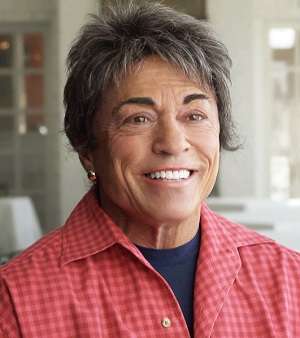Rita Mae Brown- Queer Icon

By Nikita Pradhan
Rita Mae Brown is an American writer, activist, and feminist who is best known for her first novel Rubyfruit Jungle and the mystery series, Mrs. Murphy. Born in 1994 in Pennsylvania, Rita was raised by her mother’s cousin Julia Browns and her husband, who retrieved her from an orphanage.
Growing up, Brown faced a hard time trying to pursue higher education. In 1962, Brown received a scholarship to attend the University of Florida but was later expelled by the university for participating in the civil rights movement. With a hope to transfer to a more tolerant institution, Brown hitchhiked to New York, where she received a degree in Classics and English from New York University (NYU). While at NYU, there were times when she was homeless.
Brown became actively involved in politics in the 1960s after she became part of the American Civil Rights movement. She actively participated in the anti-war movement, the gay liberation movement, and the feminist movement. Brown also actively spoke about the exclusion lesbians faced from the feminist movements of that time and has been vocal about the intersectionality of the two.
Brown left the Student Homophile League of Columbia University because of their disinterest in women’s rights and she left the National Organisation for Women (NOW) because of its attempts at distancing itself from lesbian organizations. Brown claimed that the word “lesbian” was “the one word that can cause the Executive Committee [of NOW] a collective heart attack.” In the 1970s, Brown became the founding members of The Furies Collective, a lesbian feminist collective that considered heterosexuality as the root of all oppression. Brown was also the co-writer of the Woman-identified Woman manifesto which is considered a foundational turning point document in the women’s rights movement.
In an interview in 2008 with Time, Brown said that she doesn’t believe in straight or gay and thinks that everyone is all “degree of bisexual”. In an interview with The Washington Post in 2015, Brown further said that she is “remotely interested in being gay.” She said that it is one of the “completely useless and confining categories”. Brown said that these categories are defined by the oppressors and that she wouldn’t define herself in terms of the oppressor. “You accept these terms; you’re now lumped in a group. Now, you may need to be lumped in a group politically to fight that oppression; I understand that, but I don’t accept it,” she said. Brown’s novel Rubyfruit Jungle is often regarded as a lesbian coming of age novel. However, Brown insists that the novel was not written as a discussion of sexuality. Brown has always maintained that one’s sexuality is the least interesting thing about them. For her, sexuality is the definition of the oppressor, and as she said, “If you are put into a little box according to who you sleep with, how tacky is that?”
References:
https://en.m.wikipedia.org/wiki/Rita_Mae_Brown https://www.washingtonpost.com/entertainment/books/rita-mae-brown-awarded-as-pioneer-of-lesbian-literature-scoffs-at-the-term/2015/05/30/60169a62-00a5-11e5-833c-a2de05b6b2a4_story.
html http://content.time.com/time/arts/article/0,8599,1723482,00.html https://www.vice.com/en_us/article/bmw9q8/rita-mae-brown-rubyfruit-jungle-interview https://www.barnesandnoble.com/blog/teen/your-sexuality-is-the-least-interesting-thing-about-yo u-rita-mae-brown-on-the-eve-of-rubyfruit-jungles-rerelease/
Rita Mae Brown- The one who’s sexuality isn’t the most interesting thing. Rita Mae Brown is an American writer, activist, and feminist who is best known for her first novel Rubyfruit Jungle and the mystery series, Mrs. Murphy. Born in 1994 in Pennsylvania, Rita was raised by her mother’s cousin Julia Browns and her husband, who retrieved her from an orphanage.
Growing up, Brown faced a hard time trying to pursue higher education. In 1962, Brown received a scholarship to attend the University of Florida but was later expelled by the university for participating in the civil rights movement. With a hope to transfer to a more tolerant institution, Brown hitchhiked to New York, where she received a degree in Classics and English from New York University (NYU). While at NYU, there were times when she was homeless.
Brown became actively involved in politics in the 1960s after she became part of the American Civil Rights movement. She actively participated in the anti-war movement, the gay liberation movement, and the feminist movement. Brown also actively spoke about the exclusion lesbians faced from the feminist movements of that time and has been vocal about the intersectionality of the two.
Brown left the Student Homophile League of Columbia University because of their disinterest in women’s rights and she left the National Organisation for Women (NOW) because of its attempts at distancing itself from lesbian organisations. Brown claimed that the word “lesbian” was “the one word that can cause the Executive Committee [of NOW] a collective heart attack.” In the 1970s, Brown became the founding members of The Furies Collective, a lesbian feminist collective that considered heterosexuality as the root of all oppression. Brown was also the co-writer of the Woman-identified Woman manifesto which is considered a foundational turning point document in the women’s rights movement.
In an interview in 2008 with Time, Brown said that she doesn’t believe in straight or gay and thinks that everyone is all “degree of bisexual”. In an interview with The Washington Post in 2015, Brown further said that she is “remotely interested in being gay.” She said that it is one of the “completely useless and confining categories”. Brown said that these categories are defined by the oppressors, and that she wouldn’t define herself in terms of the oppressor. “You accept these terms; you’re now lumped in a group. Now, you may need to be lumped in a group politically to fight that oppression; I understand that, but I don’t accept it,” she said. Brown’s novel Rubyfruit Jungle is often regarded as a lesbian coming of age novel. However, Brown insists that the novel was not written as a discussion of sexuality. Brown has always maintained that one’s sexuality is the least interesting thing about them. For her, sexuality is the definition of the oppressor, and as she said, “If you are put into a little box according to who you sleep with, how tacky is that?”
References:
https://en.m.wikipedia.org/wiki/Rita_Mae_Brown https://www.washingtonpost.com/entertainment/books/rita-mae-brown-awarded-as-pioneer-of-le sbian-literature-scoffs-at-the-term/2015/05/30/60169a62-00a5-11e5-833c-a2de05b6b2a4_story.
html http://content.time.com/time/arts/article/0,8599,1723482,00.html https://www.vice.com/en_us/article/bmw9q8/rita-mae-brown-rubyfruit-jungle-interview https://www.barnesandnoble.com/blog/teen/your-sexuality-is-the-least-interesting-thing-about-yo u-rita-mae-brown-on-the-eve-of-rubyfruit-jungles-rerelease/


